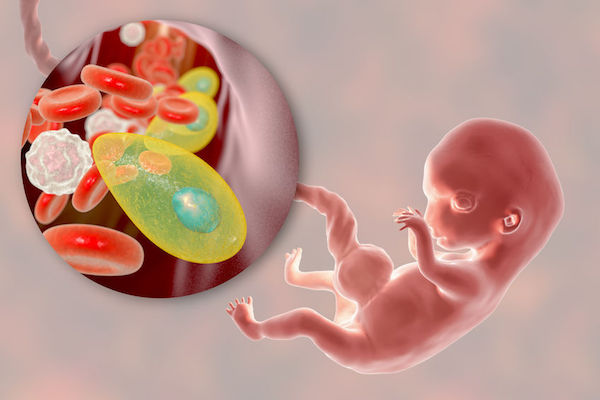Toxoplasmosis is a disease that results from infection by a microscopic parasitic organism called Toxoplasma gondii.

In generally healthy people, toxoplasmosis may present with no signs or symptoms, and may have no ill effects at all. However, it causes serious complications to an unborn baby if contracted during pregnancy, especially from the second through to the sixth month. It causes lesions to the central nervous system of the foetus that may lead to blindness and brain disorders, among others. It is also a serious condition if contracted by those with a compromised immune system.
The parasite can be spread to humans via cats’ faeces, drinking contaminated water, or eating contaminated raw or undercooked meat.
What are its symptoms?
In healthy individuals, toxoplasmosis may present with little or no signs or symptoms, as the body’s immune system keeps the parasitic infection in check.
In those who do show symptoms, the following may occur:
In people who have weakened immune systems, that is, those with HIV/AIDS, people undergoing chemotherapy, or recent organ transplant recipients, the following symptoms can occur:
- Headache
- Blurry vision
- Poor coordination
- Confusion
- Seizures
- Lung infections similar to tuberculosis (TB) or pneumonia
Symptoms and signs in babies who have congenital toxoplasmosis include the following:
- An enlarged liver and spleen
- Severe eye infections
- Seizures
- Jaundice
How is it diagnosed?
For a toxoplasmosis diagnosis, a blood test will be done to establish the presence of antibodies – these are proteins your body produces in response to the parasite. If you are tested during early infection, your body may not have yet produced the antibodies, so your doctor may recommend you return for another test a few weeks later.
A positive result could mean you have an active infection, or that you were once infected and are now immune. Additional tests can be performed to establish when the infection occurred, which is important information if you are pregnant or have a weakened immune system.
Testing an unborn baby for toxoplasmosis can be done by taking a sample from the amniotic sac in a procedure known as an amniocentesis.
What are your treatment options?
In acute toxoplasmosis in generally healthy people, pyrimethamine (anti-malaria medication) may be prescribed in conjunction with the antibiotic, sulfadiazine.
For those with HIV/AIDS, the same combination is recommended with additional folic acid. Special considerations need to be given to pregnant women who are infected, and treatment options should be discussed with your doctor.
Can it be prevented?
Taking certain precautions can help prevent toxoplasmosis. These include:
- Wear gloves whenever you work outdoors and wash your hands thoroughly afterwards.
- Lamb, pork and beef may harbour the toxoplasmosis parasite, so cook these meats thoroughly. After preparing meat, wash knives and cutting boards thoroughly.
- Avoid unpasteurised milk.
- Wash all fruit and vegetables, and remove the peel if you plan to eat them raw.
- If you have a sand pit, cover it when it’s not in use to keep cats from using it as a litter box.
If you have cats and are pregnant or otherwise at high risk, the following is advised:
- Feed your cat dry or canned food, not raw meat. Cats can become infected from eating raw or undercooked meat, or wild prey.
- Let someone else clean the cat’s litter box, or wear gloves and a mask if you have to do it yourself.
- Avoid stray cats or kittens.
IMAGE CREDIT: 123rf.com
